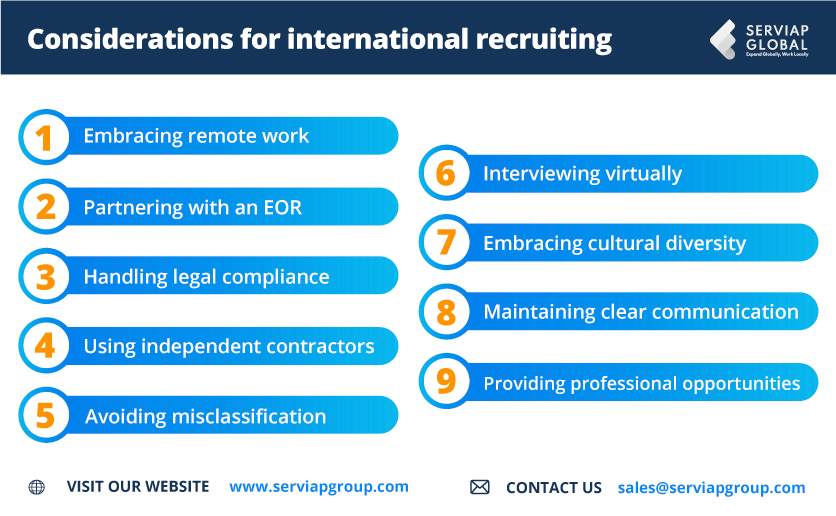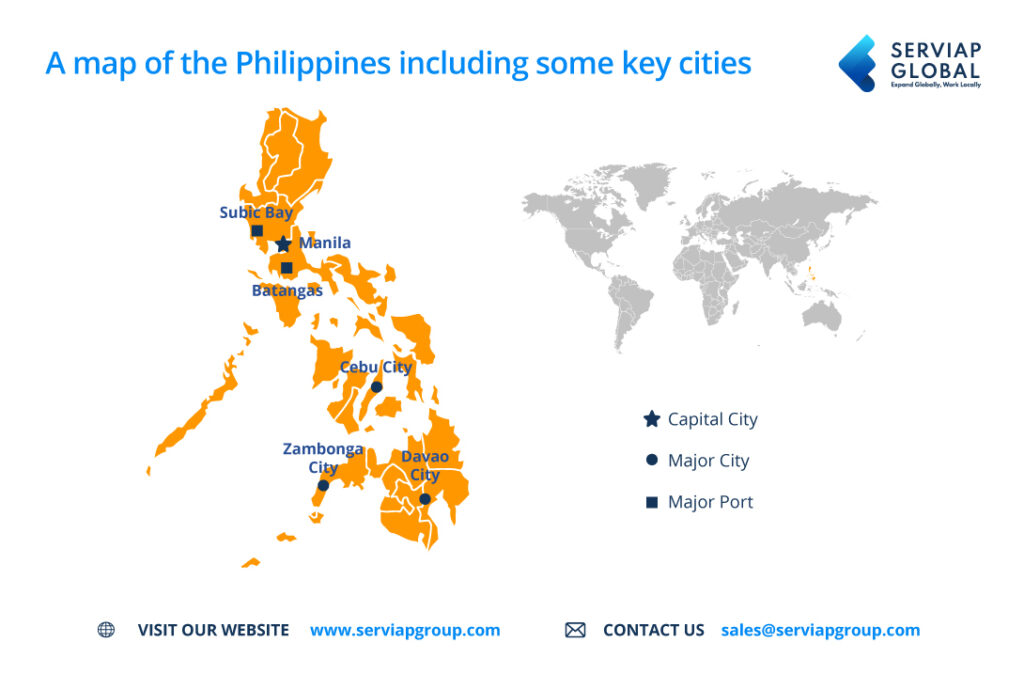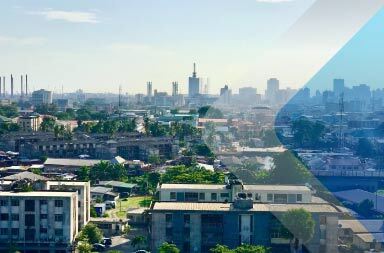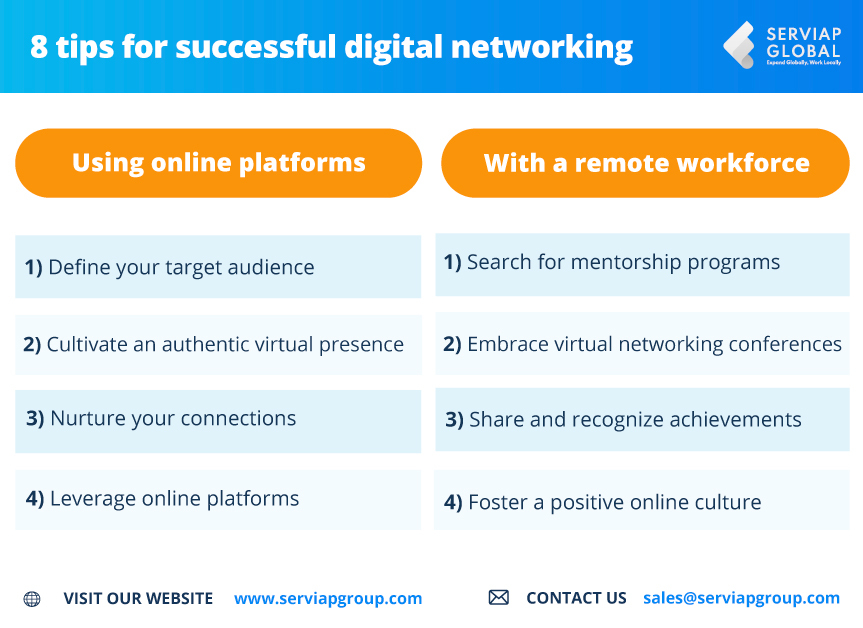In recent years, hiring professionals via an EOR in El Salvador has become increasingly attractive, as this Central American country has bet on new technologies and promoted education among its people.
If you are interested in acquiring talent in this country filled with potential, an EOR in El Salvador will hire professionals on your behalf, supervise payroll, and manage your human resources, always ensuring compliance with local laws and minimizing any risk related to international recruitment.
SEE ALSO: Call center outsourcing: 5 great destinations to consider
Working with an EOR in El Salvador will also help you save time and money, as you will not have to establish a subsidiary of your company. These providers have established legal entities and know the market and its legislation, which is vital to expanding a successful business in this territory.
Note that thanks to their co-employment services, an EOR in El Salvador can also be known as a professional employer organization (PEO or PEO International).
Contact us to find out how we can help you hire in this territory and the rest of Central America.
El Salvador: country overview
El Salvador, located on the coast of the Pacific Ocean, is a country that borders Guatemala and Honduras in an area of just 21 square kilometers, making it the smallest nation in terms of size in Central America.
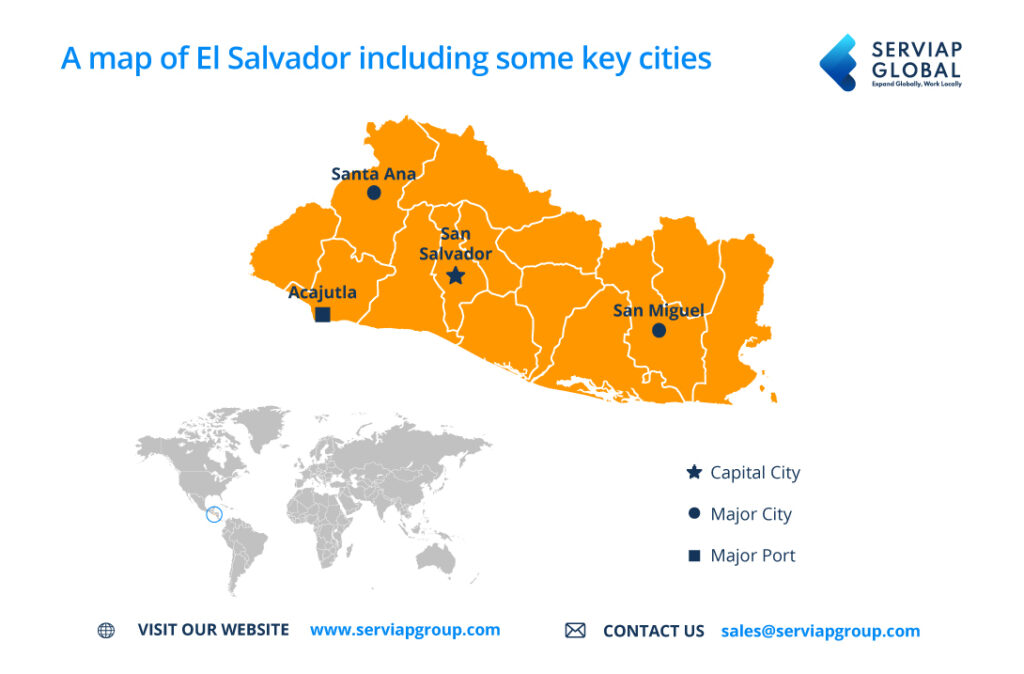

The official language of this country is Spanish. English is learnt at school, meaning that it is widely understood, especially by those with higher education. Due to the influence of the United States in the territory, from popular culture to business, the language continues to be popular.
The capital and most populated city is San Salvador, in whose metropolitan area the economic and political activity of the nation is concentrated. Santa Ana stands out for its culture and textile production, and San Miguel is known for being the economic powerhouse of the eastern zone.
El Salvador is home to 6.5 million people with traditions that date back to pre-Hispanic times and are mixed with Spanish and African customs that give way to a multicultural nation with a rich history.
Although this nation has undergone many political and administrative changes over the years, its economy has improved, poverty and inequality have decreased, and it has focused on the continued development of its workforce.
Technological development is also vital in this territory, with projects such as the Digital Agenda 2020-2030, a set of government actions aimed at innovation, education, and the application of ICTs in all areas of the country. Bitcoin has been accepted as legal tender in a pioneering experiment with digital currencies.
The Salvadoran market at a glance
According to the Economic Commission for Latin America and the Caribbean (ECLAC), El Salvador is Central America’s second-fastest-growing economy, driven mainly by agriculture, manufacturing, and services.
In terms of agriculture, the most exported products are cotton, coffee, and sugar cane, in addition to beef production and timber resources.
Manufacturing in this land involves processing agricultural products such as food and textiles and producing large quantities of pharmaceuticals, chemicals, and electronic materials.


However, the services sector, mainly financial and tourism, contributes the most to the Salvadoran economy: it represents almost 60% of the national GDP.
Regarding human talent, the Salvadoran approach for more than two decades has offered outsourcing services to nations such as the United States, with a solid group of workers with technical skills, specialists in programming and engineering, and software development.
To provide quality human talent, the government has focused its efforts on offering universal education, minimizing illiteracy rates, and providing technology-focused secondary and higher education.
In addition, through treaties such as the United States-Central America-Dominican Republic Free Trade Agreement (CAFTA-DR), El Salvador facilitates trade and foreign investment by reducing tariffs and opening markets. Some industries, such as telecommunications and electricity distribution, have also been privatized.
Hire professionals with an EOR in El Salvador
An EOR in El Salvador is a fast and reliable solution for those companies looking to add to their teams highly trained personnel to work remotely from this Central American nation.
Employers of record are third parties that recruit and manage personnel on behalf of their clients following the Salvadoran administration, so companies that rely on their services will not have to worry about setting up a local entity, a process that can take time and money.
Additionally, as a legal employer, the EOR in El Salvador minimizes any risks related to international recruitment. These experts know the local market, its laws, and areas of opportunity. They also help you to classify your team members correctly.
Thanks to the EOR’s recruitment networks, you can have staff working from El Salvador within weeks. Also, while you incorporate your team, the legal employer manages your human resources, such as payroll, tax calculation, vacations, benefits, and contract recession.
Note that an EOR in El Salvador may also be known as an international PEO or professional employer organization for its co-employment services. Many providers make no distinction between the two names and offer their services interchangeably.
Regulations an EOR in El Salvador will take care of
These are some of the regulations that your EOR in El Salvador will take care of. Consult our knowledge base for more information.
Contracts: contracts in El Salvador can be indefinite, temporary, and for intermediate terms, have the information of the hiring party, the work to be performed, the duration of the contract, the working hours, the salary (in US dollars), and the signature of both parties, among other stipulations of the Labor Code of the Republic of El Salvador. Trial periods, in turn, may be 30 days at maximum.
Termination: a contract terminates upon expiration, death of the employee, legal incapacity, or dissolution of the company. An employee may be fired for multiple reasons, such as negligence, immorality, or absence from the workplace without justification. As for the severance pay, it will vary depending on the reasons that led to the termination of the contract.
Minimum wage: the minimum wage varies, but for the industry, commerce, and services sectors, it is USD 365 per month. In addition, the legislation provides an annual bonus: 15 days’ salary for employees with 1 to 3 years of service, 19 days’ pay for 3 to 10 years, and 21 days’ salary for more than ten years of service.
Working hours: working hours are 8 hours per day, with a maximum of 44 hours per week.
Vacations and official holidays: in El Salvador, employees are entitled to 15 days of paid leave per year, which cannot be compensated economically. Holidays are 11 and are paid double if worked.
Medical leave: up to 26 weeks of sick leave; the employer covers the first three days, the rest by social security.
Maternity and paternity leave: mothers have 18 weeks of maternity leave, 12 before and six after childbirth. Fathers, on the other hand, have a three-day leave.
Taxes: sales tax in El Salvador is 13%. In comparison, residents and non-residents pay income taxes ranging from 5% to 35%, depending on their income.
EOR in El Salvador: 6 steps for successful recruitment
In order to hire top professionals via an EOR in El Salvador you will need to follow these six steps:
1) Find an EOR in El Salvador
To hire in this Central American nation, the first thing you must do is find an EOR in El Salvador that understands your hiring needs, fits your budget, and offers the services you require, whether it’s international PEO or EOR recruitment, talent acquisition, contractors or visa and work permit processing.
2) Define your requirements
Conquering the Salvadoran market will be easier if you determine the profile of the professionals you need for your international expansion and their knowledge, background, and skills. This information will help your EOR in El Salvador in the search and recruitment of local talent to grow your business.
3) Complete preliminary screening
Sharing your company’s vacancies on your EOR’s recruitment channels in El Salvador means job applications and resumes will arrive in a few days. Of all the candidates that apply, the employer of record will make a preliminary selection of those professionals that meet the established requirements.
4) Start interviews
The round of interviews will be conducted with the strongest candidates, first to get to know them and then to check that they have the skills and knowledge described in their applications. Those who stand out and satisfy the hiring company’s requirements will be considered to join the organization.
5) Send job offers
One of the advantages of working with an EOR in El Salvador is that it will be in charge of sending job offers to selected candidates based on local regulations. If necessary, it will negotiate with the professionals until the signing of the contracts, which must include information such as the name of team members and the employer, salaries, working hours, recession policies, and any clauses required by Salvadoran regulations.
6) Initiate onboarding
With both parties happy after signing the contract, while the EOR in El Salvador finalizes the recruitment procedures, you can start onboarding your new professionals, introduce them to the rest of the team, delegate the first tasks, talk to them about your organization’s values and share any relevant information to get them started.
Alternatives to hiring via an EOR in El Salvador
You can hire professionals through an EOR in El Salvador, but other recruitment options exist. For example, suppose you need several team members and have the resources to have an office in this territory. In that case, it is best to open a legal entity.
Having an entity in El Salvador would also minimize any outsourcing-related risks. However, it will also take more time and can be complicated, especially when unfamiliar with the Salvadoran market and labor and tax laws.
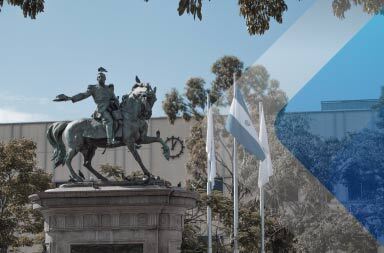

Another option is direct hiring, which can be done by searching for professionals on the internet or on platforms where they offer their services. An EOR in El Salvador can also provide this benefit as part of its offer and streamline the whole process.
Finally, there are international contractors, professionals with whom you can work for a specific period or project. These experts usually have specialized knowledge, flexible schedules, and use their tools.
While they may work full-time as a regular employee, international independent contractors operate for their own company, which provides their services to employers.
These experts are not part of the payroll but have other rights and obligations. Therefore, you should be careful and classify them well to avoid fines or termination of operations.
Serviap Global can be your EOR in El Salvador
At Serviap Global, we are experts in recruitment in Central America, so we can be your EOR in El Salvador. Our offering includes international PEO / EOR services, international contractors, and global talent acquisition for direct hire.
We started working in Mexico more than a decade ago and then expanded throughout Latin America and the rest of the world. Today we offer services in more than 100 countries so our clients can hire local professionals without complications.
Contact us to find out how we can help you as an EOR in El Salvador or other countries in Central America.
Use our free risk calculation tool and avoid misclassification of contractors. You can also get an idea of the total payroll cost in El Salvador and other territories with our free paycheck calculator.
